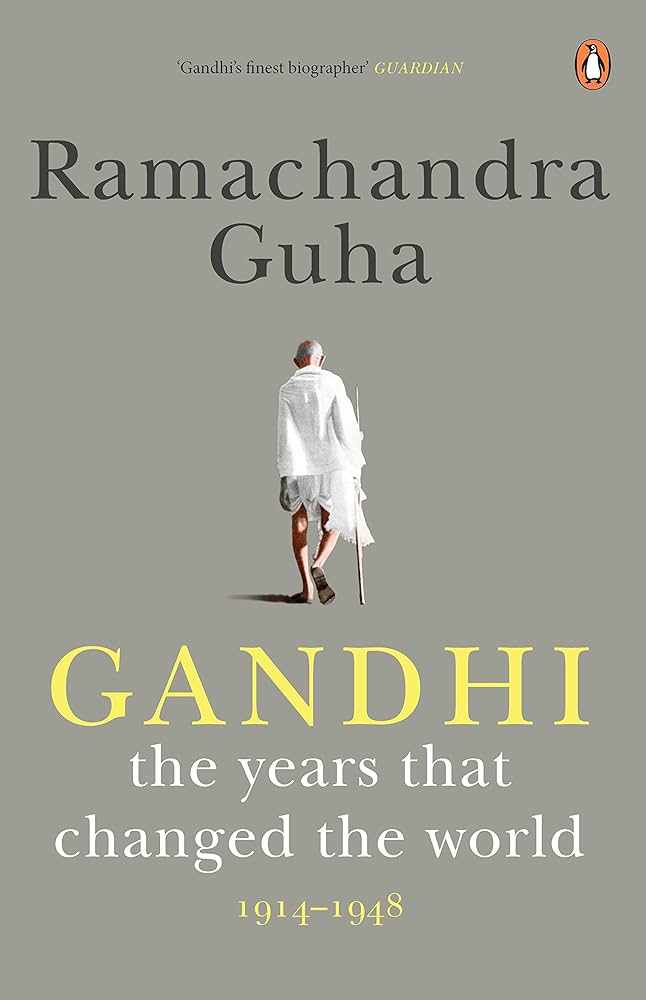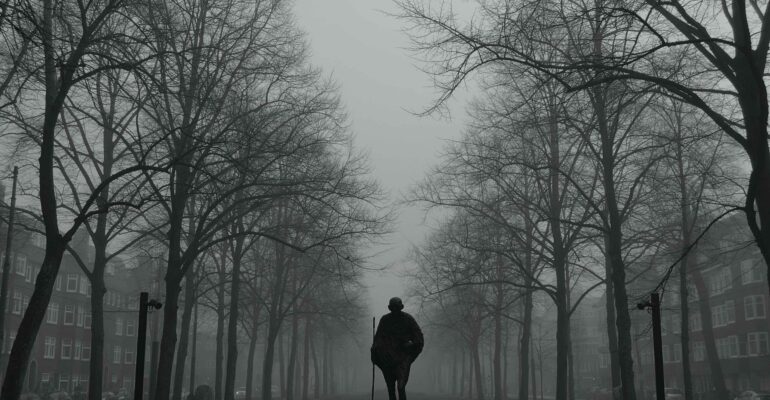What makes MK Gandhi a complete leader
He’s regarded as the greatest Indian who ever lived. But how much do we really know about Mahatma Gandhi?
I’ve been reading the magisterial book ‘Gandhi: The Years that Changed the World‘ by Ramachandra Guha… and have been utterly fascinated by some new facts and facets that I learned about the great soul.

What makes MK Gandhi so special?
I think it’s the fact that he was a complete leader. India was very lucky to have had someone as “sarva-guna-sampann” as him to lead our fight for freedom – not just from British rule, but also from caste discrimination, and from religious animosity (although the latter two aims were too challenging even for his formidable talents).
As I was reflecting on Gandhi’s strengths, I realised that leaders can be evaluated on seven key parameters. Parameters that – and I know this would sound cheesy – can be understood using the analogy of a human body: Eyes, Heart, Soul, Brain, Ears, Mouth, and Hands. Here’s what each of them stands for:
- Eyes: The scale of the leader’s ambition and vision
- Soul: Their ethos, credibility, and purity of intention
- Heart: The courage of their conviction and empathy for others
- Brain: The ability to think clearly and break major projects down to smaller tasks
- Ears: The ability to listen and gather data from all sources
- Mouth: The ability to communicate clearly and consistently
- Hands: Their willingness to put in the hard work, get their hands dirty, and execute.
In real life you might find leaders who are good at a few of these parameters. Some exceptional leaders might score high on maybe four or five of them.
What made Gandhi unique was his extraordinary ability on ALL the seven parameters.
Here are some specific instances that illustrate his unique strengths (all quotes are from the book):
1. Eyes: Scale of ambition and vision
When Gandhi came to India from South Africa, there was no single pan-India mass leader. India is a continent and it is almost impossible for one person to capture the imagination and hearts of the entire nation from Kashmir to Kanyakumari and from Gujarat to Guwahati. Gandhi realised, however, that he would have to do that:
…even more critical was the scale of his political ambition. Tilak was a mass leader in western Maharashtra alone. If he ventured outside his province, it was to address city audiences in English. But Gandhi travelled everywhere. UP, Bihar, Bengal, Assam, the Tamil and Telugu country, Maharashtra, Punjab—Gandhi went to all these places, visiting cities and towns small and even smaller.
Also, for a poor country like India, in the late 1910s, just getting independence might have seemed like a tall ambition. But Gandhi was not satisfied by that:
Gandhi reminded the readers of Young India of the four key elements of the nationalist credo: unity between Hindus and Muslims and all other faiths; manufacture and use of handmade cloth; abolition of untouchability; and a strict adherence to non-violence. ‘These are like the four posts of a bedstead,’ he wrote. ‘Remove one of them and it cannot stand.’
Gandhi would keep alternating his attention between these four key elements on the road to swaraj.
2. Soul: Their Ethos and purity of intention
Gandhi’s renunciation of all worldly pleasures gave him strong credibility – and made his opponents fear him:
Murray (refers to Gilbert Murray, an Oxford classicist who wrote on Gandhi) remarked: Persons in power should be very careful how they deal with a man who cares nothing for sensual pleasure, nothing for riches, nothing for comfort or praise or promotion, but is simply determined to do what he believes to be right. He is a dangerous and uncomfortable enemy – because his body, which you can always conquer, gives you so little purchase upon his soul.
And this:
No political leader before Gandhi had so radically simplified his life. The clothes he wore, the food he ate, the homes he lived in, all brought Gandhi far closer to the masses than professedly socialist leaders like Lenin.
Gandhi was not a commanding personality or speaker. But he had a strong presence:
Even those who attended his talks didn’t always hear or understand his words. He spoke softly, and microphones were not yet in common use. Yet he had a presence. This was communicated by his dress, the ordinary loincloth that denoted a life of simplicity and sacrifice.
3. Heart: The courage of their conviction and empathy for others
In the early days after Sabarmati Ashram was set up, Gandhi got a request from a social worker: “a humble and honest untouchable family is desirous of joining your Ashram. Will you accept them?”
The decision was not an easy one, even for Gandhi:
This letter, recalled Gandhi in his autobiography, ‘perturbed’ him. He had taken a public stance against the practice of untouchability. However, in matters of caste the Hindus of Ahmedabad were cautious and conservative. So soon after he had moved to their city, should he challenge their prejudices in so open a manner?
Gandhi decided to accept the family. The implications were not pleasant:
When they arrived at the Satyagraha Ashram on 11 September, there was much grumbling, not least from Gandhi’s own family members. Kasturba was not happy with this decision to defy the orthodox. Danibehn (a member from the ‘untouchable’ family) was prevented from drawing water from the common well until Gandhi said in that case he would not use the well either.
On 23 September, Gandhi wrote to Srinivasa Sastri about the turmoil caused by the admission of the ‘untouchable’ family. ‘There was quite a flutter in the Ashram,’ he remarked. ‘There is a flutter even in Ahmedabad. I have told Mrs. Gandhi she could leave me and we should part good friends’.
For his cause, he was willing to renounce his marriage of thirty-two years!
Another way he showed courage was in speaking truth to power. In the early days post his return to India, Gandhi gave a speech during the inauguration of the Banaras Hindu University. In attendance were many princely state rulers, who were the university’s main patrons. In his speech, Gandhi did not mince his words, attacking the princes for their ostentatious jewellery:
Was it necessary, asked Gandhi, ‘that in order to show the truest loyalty to our King-Emperor, it is necessary for us to ransack our jewellery-boxes and to appear bedecked from head to toe’?
If he had the courage to start mass movements, he also had the conviction to suspend them, if things became overly violent:
In view of ‘the tragic and terrible events at Chauri Chaura, the Congress had decided to suspend civil disobedience, advise cultivators to pay land revenue, and not hold processions or public meetings. The working committee outlined a new programme for the Congress, focusing on the promotion of spinning and of temperance, the abolition of untouchability, and the organization of village and town panchayats to settle disputes peaceably.
Gandhi was also a master of empathy even when it came to his opponents. When he was supporting a movement to remove caste-based restrictions in Kerala, he was willing to speak to all parties:
Gandhi urged the protesters to cultivate a ‘detached state of mind’, adding that ‘three fourths of the miseries and misunderstandings in the world will disappear, if we step into the shoes of our adversaries and understand their standpoint’. Gandhi himself sought an audience with the high-caste Namboodiri Brahmins who were most bitterly opposed to granting the Ezhavas and Pulayas the right to walk on the roads outside the temple.
4. Brain: The ability to calmly plan, break tasks down,
Gandhi had the ability to break his vision down into smaller, attainable steps:
He outlined in print a programme of ‘non-co-operation’, to unfold in four stages. The first entailed the giving up of titles; the second the resignation from government service of select officials; the third stage—a ‘distant goal’—the resignation of policemen and soldiers; the fourth stage, ‘still more remote’, the non-payment of taxes.
5. Ears: The ability to listen and gather data from all sources
There are several instances where Gandhi faced a difficult problem – and started with listening.
For instance, when he went to Champaran (the site of his famous first satyagraha) to solve the issues faced due to forced indigo farming, he relied on a ton of primary research:
He based himself alternately in Champaran’s two main towns, Motihari and Bettiah. Some days he ventured into the villages himself. He met many peasants, and also spoke to European planters and factory managers.
By the end of May, Gandhi had collected almost 7000 testimonies. In early June he travelled to Bihar’s summer capital, Ranchi, to place them before the lieutenant governor of the state. The evidence was overwhelming.
7,000 testimonies – by just one man and his team. Roaming around rural Bihar in the peak heat of summer in 1917. Incredible.
This was his approach for all problems. Later when he was confronted by a textile workers strike in Ahmedabad, he again relied on data to make his recommendation:
On returning to Ahmedabad, Gandhi asked his associates to give him data on the workers’ living conditions, and on wages in Ahmedabad’s mills as compared to other cities. The evidence suggested that the workers deserved a better deal.
And when he was preparing a detailed report on the dastardly Jallianwala Bagh massacre:
Gandhi and his associates had now recorded the testimonies of some 1700 witnesses to the happenings of March–April 1919. With this mountain of material, he proceeded, alone, to Banaras, where he stayed in Madan Mohan Malaviya’s house and hammered out a first draft of the Congress report on the Punjab.
6. Mouth: The ability to communicate clearly and consistently
Gandhi was an excellent storyteller – clear, consistent, and empathetic in his communication. He was a prodigious writer and publisher, constantly endeavouring to put his thoughts into the written word.
And when communicating, he used language that was understood by his audience:
He spoke not in English but in Hindustani, the lingua franca of much of northern and eastern India, with interpreters at hand to render his words into Tamil or Bengali or Marathi or Telugu or whatever the local language would have been.
His words—when they were heard—were clear and direct, addressing the everyday life of Indians, in an idiom derived from their own myths and traditions.
He frequently used analogies to make his points reach the masses:
Gandhi went on to say: If I get a sour loaf, I reject it; I do not take it. But if I get a loaf which is not enough or which does not contain sufficient condiments in it, I shall see to it that I get condiments too at a later stage, but I take a bite; then it is not disappointing.
Gandhi told Narayana Guru that ‘no two leaves of this very tree, under whose shadow we are sitting, are alike, though they spring from the same root, but, even as the leaves live together in perfect harmony and present to us a beautiful whole, so must we, divided humanity present to the outsider looking upon us as a beautiful whole’. Gandhi himself sought an audience with the high-caste Namboodiri Brahmins who were most bitterly opposed to granting the Ezhavas and Pulayas the right to walk on the roads outside the temple.
7. Hands: Their willingness to physically put in the hard work, get their hands dirty, and execute.
Leaders need to visit their followers – and there is no substitute for the physical grind of travel:
After the special session of the Congress in Calcutta, Gandhi resumed his travels. In October, he toured the Punjab and the United Provinces; in November, the Bombay Presidency and his native Gujarat. The magnificently detailed chronology of his life by Chandubhai Dalal tells us that he visited nineteen towns and cities in the first month, and as many as twenty-nine in the second. Everywhere, he spoke at public meetings and, before or after these meetings, talked to delegates likely to attend the Congress session in Nagpur in December.
As Ram Guha writes, Gandhi’s true home was the railway compartment:
Although formally based in Ahmedabad, Gandhi’s real home was not so much the ashram on the banks of the Sabarmati as a third-class railway compartment. In and through his journeys by train, Gandhi saw a great deal of India and Indians, and they saw a great deal of him in return.
Gandhi was certainly not perfect. Though he was called the Father of the Nation, he was an overbearing and severely strict father to his own sons. Although he encouraged women to participate in politics, he was quite patriarchal and controlling when it came to the women in his life. And when it came to new ideas outside his core principles, he could be dogmatic and unmoving.
But for one leader to take on such massively intractable problems like foreign rule, caste discrimination, religious animosity, and lack of self-reliance, and try to solve them using the principle of non-violence… while uniting the efforts of 300+M diverse people of the Indian sub-continent – was a truly remarkable achievement.
As Albert Einstein said: “Generations to come will scarce believe that such a one as this ever in flesh and blood walked upon this earth.“
This Mahatma Jayanthi, get yourself a copy of Ram Guha’s excellent book – and prepare to be wowed by the contents.
PS: If you would like to introduce Gandhi to younger kids, I would suggest showing them the movie “Lage Raho Munnabhai” 🙂
Featured Image: Photo by Greg Schneider on Unsplash




